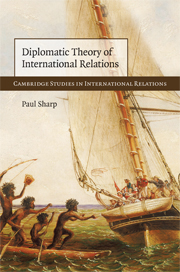Book contents
- Frontmatter
- Contents
- Acknowledgements
- Introduction
- Part I Traditions of international thought and the disappointments of diplomacy
- 1 Diplomacy and diplomats in the radical tradition
- 2 Diplomacy and diplomats in the rational tradition
- 3 Diplomacy and diplomats in the realist tradition
- Part II Elements of a diplomatic tradition of international thought
- Part III Diplomatic understanding and international societies
- Part IV Thinking diplomatically about international issues
- Conclusion
- Bibliography
- Index
- Cambridge Studies in International Relations
3 - Diplomacy and diplomats in the realist tradition
Published online by Cambridge University Press: 05 June 2012
- Frontmatter
- Contents
- Acknowledgements
- Introduction
- Part I Traditions of international thought and the disappointments of diplomacy
- 1 Diplomacy and diplomats in the radical tradition
- 2 Diplomacy and diplomats in the rational tradition
- 3 Diplomacy and diplomats in the realist tradition
- Part II Elements of a diplomatic tradition of international thought
- Part III Diplomatic understanding and international societies
- Part IV Thinking diplomatically about international issues
- Conclusion
- Bibliography
- Index
- Cambridge Studies in International Relations
Summary
The intuitive attractiveness of the power political, or realist, tradition in international thought is very strong. It is said to dominate the way in which both practitioners and students of international relations think about international relations. In their different ways both struggle with varying degrees of success against the gravitational forces political realism is said to exert. The practitioners try to be good but are overwhelmed. The academics assert, and have been asserting for at least the last forty years, that the realist hegemony over their field has been recently overthrown, yet their stories still seem to orbit the power political account of international politics, whether as commentaries or critiques. It is something of a puzzle and a shock, therefore, to realize that the salience of the realist tradition is matched by the difficulty of specifying exactly what is being claimed within it and why. It is certainly no clearer than the other two traditions and, in some respects, less so. People are said to want power, but what power is and why they want it are both very difficult questions to answer. It is useful to start by thinking in terms of people with material needs and psychological wants living in a resistant environment populated by other people with needs and wants. This, at least, seems reasonable. Quite how one gets from this to the various accounts of international politics as occurring between interest-driven states for which the accumulation and retention of power overrides all other concerns, however, is by no means clear.
- Type
- Chapter
- Information
- Diplomatic Theory of International Relations , pp. 53 - 72Publisher: Cambridge University PressPrint publication year: 2009

